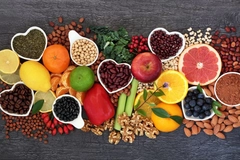
- Industry news
Industry news
- Category news
- Reports
- Key trends
- Multimedia
Multimedia
- Journal
- Events
- Suppliers
Suppliers
- Home
- Industry news
Industry news
- Category news
- Reports
- Key trends
- Multimedia
Multimedia
- Events
- Suppliers
Suppliers
Heart-healthy lipids: Kensing’s sunflower phytosterols achieve EFSA novel food approval
Key takeaways
- Kensing’s sunflower-derived Sunvasterol phytosterols have received EFSA novel food authorization, granting the company commercial exclusivity in the EU.
- Sunvasterol offers an alternative to traditional sterols, which carry EFSA-approved health claims for heart health.
- The ingredient can be incorporated into various fat-containing foods, enabling manufacturers to develop products that support cholesterol reduction.
Kensing’s Sunvasterol upcycled plant sterol has gained novel food authorization from the European Food Safety Authority (EFSA). The ingredient with natural sunflower-sourced phytosterols can benefit from EFSA-approved claims for plant sterols’ heart health benefits. Kensing will showcase Sunvasterol at the upcoming Food ingredients Europe (FiE) trade show in Paris, France (Dec 2–4).
The new EFSA approval grants Kensing commercial exclusivity for Sunvasterol in Europe. Other producers wanting to enter the EU with the same type of sunflower sterol would have to file their own documentation through EFSA or obtain consent from the company.
“We are very excited to receive this approval, which allows us to offer an additional source of non-GMO, allergen-free phytosterols that are fully disconnected from deforestation and traceability challenges, providing a sustainable alternative,” says Serge Rogasik, CEO of Kensing.
“The EFSA approval confirms that sunflower-derived phytosterols deliver a strong cholesterol-lowering benefit, similar to our other EFSA-approved sterols. Sunvasterol achieves this with no compromise on efficacy, while enhancing the natural profile of the ingredient. We are a fully integrated producer of sunflower sterols and esters, allowing us to better control traceability.”
Sunvasterol is derived from sunflower oil distillates, an upcycled byproduct of sunflower oil. Kensing states it will increase production capacity to meet new waves of product demand. Its sunflower supply network spans Spain, Argentina, and the US.
Heart-healthy plant sterols
Phytosterols are a natural lipid component in oil seeds, grains, legumes, and other plant seeds. Plant sterols and stanols (a saturated version of sterols) from soy, pine, and other plants hold authorized EFSA health claims on the “maintenance of normal blood cholesterol concentrations.”
To utilize this claim, companies must inform consumers that the beneficial effect is achieved with a daily intake of at least 0.8 g of plant sterols or stanols.
These compounds reduce cholesterol by competing with dietary and biliary cholesterol — which is secreted into bile by the liver — for absorption in the intestines, thus lowering the amount of cholesterol that enters the bloodstream.
Kensing states that this absorption inhibition helps to reduce total and LDL-cholesterol levels, with positive effects well supported by extensive scientific literature across over 140 published studies.
 Kensing’s sunflower derived Sunvasterol will be on display at the upcoming FiE trade show (Dec 2–4).Another authorized EFSA health claim links the compounds to lowered blood cholesterol. According to these claims, a beneficial effect on cholesterol is obtained with a daily intake of 1.5–3 g of plant sterols or stanol esters.
Kensing’s sunflower derived Sunvasterol will be on display at the upcoming FiE trade show (Dec 2–4).Another authorized EFSA health claim links the compounds to lowered blood cholesterol. According to these claims, a beneficial effect on cholesterol is obtained with a daily intake of 1.5–3 g of plant sterols or stanol esters.
When incorporated into authorized food categories of yellow fat spreads, dairy products, mayonnaise, and salad dressings, products can claim to reduce LDL cholesterol by 7–10% if foods provide a daily intake of 1.5–2.4 g of plant sterols or stanols, or a range of 10–12.5% for foods providing a daily intake of 2.5–3 g of the compounds.
Moreover, companies must communicate how long consumers need to use these products to obtain the effect: “two to three weeks.”
Product applications
Sunvasterol contains concentrated phytosterols — beta-sitosterol, stigmasterol, and campesterol — in the form of free sterols and sunflower lipid-linked esters. Because esterification significantly increases the fat-solubility of plant sterols, Kensing notes that the ingredient can be used beyond supplements.
According to the company, manufacturers can use the ingredient to create everyday foods with cholesterol-lowering, heart-healthy functionality. For example, Kensing states that it can easily be incorporated into fat-containing foods, including margarines and spreads, yogurts, functional dairy drinks, other dairy products, milk analog products, condiments, and salad dressings.
Products containing the ingredient can be labeled with a heart health claim and as a naturally derived source of vegetable sterol esters.
“Sunvasterol combines robust scientific validation and a smart formulation approach to create an ingredient that exerts minimal sensory impact on the carrier product,” says Alejandro Abad, executive VP and general manager Europe at Kensing.
“It does not affect the flavor or color of foods and integrates smoothly into multiple food applications without requiring reformulation or processing changes.”
Sunvasterol will be on display at Kensing’s booth at FiE (#71C20), along with its Sun E vitamin E product.


















